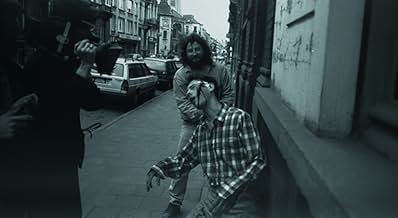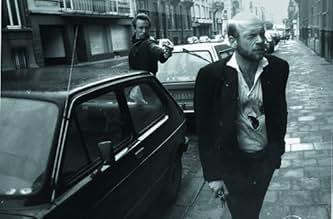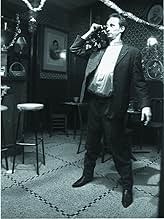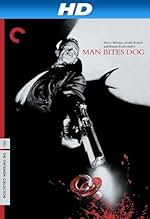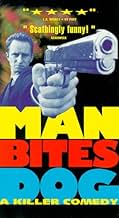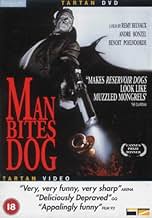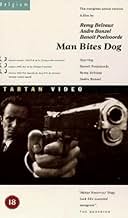VALUTAZIONE IMDb
7,4/10
45.255
LA TUA VALUTAZIONE
Una troupe cinematografica segue uno spietato ladro e assassino mentre svolge la sua routine quotidiana. Le complicazioni iniziano quando la troupe inizia a farsi coinvolgere negli eventi de... Leggi tuttoUna troupe cinematografica segue uno spietato ladro e assassino mentre svolge la sua routine quotidiana. Le complicazioni iniziano quando la troupe inizia a farsi coinvolgere negli eventi delittuosi.Una troupe cinematografica segue uno spietato ladro e assassino mentre svolge la sua routine quotidiana. Le complicazioni iniziano quando la troupe inizia a farsi coinvolgere negli eventi delittuosi.
- Regia
- Sceneggiatura
- Star
- Premi
- 7 vittorie e 5 candidature totali
Jacqueline Poelvoorde-Pappaert
- Ben's Mother
- (as Jacqueline Poelvoorde Pappaert)
Édith Le Merdy
- Nurse
- (as Edith Lemerdy)
Recensioni in evidenza
Make no mistake this is a disturbing movie. And yea it's just violence with no reason behind it. But it's portraying being on a ride with a twisted, psychotic, sociopath who doesn't care. Kind of like how a war criminal would act. And then makes some off-color jokes about it while he's killing.
Notice the art snobs on here don't only attack the movie but they need to attack the viewer as well. The movie is mocking them and they can't take it. So they write a 4 paragraph review on how much the he or she hates it and how stupid and dumb a person must be if he likes it. It's not supposed to be taken seriously.
Notice the art snobs on here don't only attack the movie but they need to attack the viewer as well. The movie is mocking them and they can't take it. So they write a 4 paragraph review on how much the he or she hates it and how stupid and dumb a person must be if he likes it. It's not supposed to be taken seriously.
I consider it a brilliant film, but also very very disturbing. I'd sooner warn people about it than recommend it, even though it's an amazing achievement. So, for what it's worth, here's my viewing experience:
I heard about this film and was immediately hooked on the absurd idea of a serial killer, on the loose, as a willing documentary subject. I also heard that it was pitch-black comedy, and a commentary on violence, society, media, etc. -- blurring the lines between observing and becoming an accomplice and whatnot.
Well, in the first two acts it certainly delivers on the absurdity and the black comedy. Both Ben and the filmmakers are as matter-of-fact about his prolific killing as if it were a documentary about urban architecture, and even in the middle of his murderous acts he remains an engaging conversationalist with all sorts of attributes our culture values: extroversion, confidence, charm, a sense of humor, and fairly informed views on diverse subjects. The juxtapositions are disturbingly hilarious. He laments that African immigrants like the one he just shot don't have equal opportunities in this racist society, or that the color and layout of a certain housing project encourages violence and other social evils. He kills an entire family in their home, then reflects on the waste of human life and how there "should be a law" against that sort of thing. He explains a lot of aspects of his trade (like how to dispose of bodies and which victims are most likely to carry money), but leaves other elements in the dark. He first seems like a murderous variety of the common robber, but then plenty of killings seem to have no material motive at all, while others are clashes with rival killers (the absurdity reaches meta-levels at some points).
I was shocked by the violence and I was also laughing, and I was feeling uneasy about that.
Many reviews talk about how the documentary crew moves from "observers" to "accomplices", but any court of law would already consider them "accomplices" within one minute of the film starting, so that development didn't register so much to me. Sure they started taking a more active part in the carnage, but this wasn't something I considered an unexpected development.
What did register to me was the shift somewhere in the third act. Suddenly I was no longer watching a dark comedy. The violence escalates to a nasty scene that I couldn't even watch, and that left me disturbed and depressed for days. It's like the movie finally decided to show me what I was looking at and say, "well, are you still laughing? Are you?" And I realized: what was there about Ben that was engaging? Even his charming ways among his friends and family were just socially acceptable methods of getting his way and remaining the center of attention, just like killing people and starring in documentaries.
So among the unexpected things I found in this film was a chillingly believable portrait of a textbook sociopath. (The scary thing is that I know someone in my neighborhood who fits that profile as well.)
The film is brilliant and disturbing. Proceed at your own risk.
I heard about this film and was immediately hooked on the absurd idea of a serial killer, on the loose, as a willing documentary subject. I also heard that it was pitch-black comedy, and a commentary on violence, society, media, etc. -- blurring the lines between observing and becoming an accomplice and whatnot.
Well, in the first two acts it certainly delivers on the absurdity and the black comedy. Both Ben and the filmmakers are as matter-of-fact about his prolific killing as if it were a documentary about urban architecture, and even in the middle of his murderous acts he remains an engaging conversationalist with all sorts of attributes our culture values: extroversion, confidence, charm, a sense of humor, and fairly informed views on diverse subjects. The juxtapositions are disturbingly hilarious. He laments that African immigrants like the one he just shot don't have equal opportunities in this racist society, or that the color and layout of a certain housing project encourages violence and other social evils. He kills an entire family in their home, then reflects on the waste of human life and how there "should be a law" against that sort of thing. He explains a lot of aspects of his trade (like how to dispose of bodies and which victims are most likely to carry money), but leaves other elements in the dark. He first seems like a murderous variety of the common robber, but then plenty of killings seem to have no material motive at all, while others are clashes with rival killers (the absurdity reaches meta-levels at some points).
I was shocked by the violence and I was also laughing, and I was feeling uneasy about that.
Many reviews talk about how the documentary crew moves from "observers" to "accomplices", but any court of law would already consider them "accomplices" within one minute of the film starting, so that development didn't register so much to me. Sure they started taking a more active part in the carnage, but this wasn't something I considered an unexpected development.
What did register to me was the shift somewhere in the third act. Suddenly I was no longer watching a dark comedy. The violence escalates to a nasty scene that I couldn't even watch, and that left me disturbed and depressed for days. It's like the movie finally decided to show me what I was looking at and say, "well, are you still laughing? Are you?" And I realized: what was there about Ben that was engaging? Even his charming ways among his friends and family were just socially acceptable methods of getting his way and remaining the center of attention, just like killing people and starring in documentaries.
So among the unexpected things I found in this film was a chillingly believable portrait of a textbook sociopath. (The scary thing is that I know someone in my neighborhood who fits that profile as well.)
The film is brilliant and disturbing. Proceed at your own risk.
Ben is a charming, witty go-getter fond of architecture, poetry and murder. A brutal serial killer, Ben is followed by a film crew who document his vicious spree of violence and barbarity. Initially they just shoot the proceedings, though as time goes by, the crew begin to take a more active hand, helping Ben torture and maim. Before long, the lines between subject and documenter are irredeemably obscured, with the crew fully in Ben's thrall. Their story escalates to a fever pitch of black comedy and savagery that will leave you thunderstruck in the audacious, wild and original 'Man Bites Dog.'
Written, produced, directed by and starring Benoît Poelvoorde, Rémy Belvaux and André Bonzel, 'Man Bites Dog' is sleek, highly entertaining and not for the faint of heart. Shot on a shoestring budget, the film impresses on every level. The narrative is unpredictable, sinister and full of pitch-black humour and raucous dialogue. So funny the film is, it plays at times like a Christopher Guest led reimagining of 'Henry: Portrait of a Serial Killer,' and is just as strange, dark and comical as that sounds. It is a very clever, frantic and tongue-in-cheek mockumentary that contains some truly unforgettable, uncomfortable moments of violence.
'Man Bites Dog' opens with a frenzied, fiendish murder on a train and never lets up, containing some genuinely distressing sequences that will give one pause. The thesis the filmmakers are operating under seems to be that visual media- television and movies- corrupts and makes complicit its audience in whatever is occurring on screen. The crew following Ben succumb to his wiles and find themselves perverted by his depravity, as do we the viewing audience. We like Ben, despite his cruel and inhuman machinations, therefore are willing participants in his spree of turpitude. It's powerful cinema, with an interesting message at its core.
The bulk of the production was undertaken by Poelvoorde, Belvaux and Bonzel, and their efforts are impressive. A visually arresting watch, 'Man Bites Dog' is shot by Bonzel, and his cinematography is artful and of great clarity. Shot in black and white, the movie has a heady atmosphere that evokes film noir, and Bonzel's work with light and shadows produces some striking results. Not once do the budgetary constraints show through the visuals, and one will assuredly remember the images from 'Man Bites Dog' long after the credits have rolled.
The sound design is also impressive. For whatever reason, oftentimes student filmmakers do far more impactful and interesting work with sound than big studios and Hollywood heads. Think of 'Eraserhead' or 'Tetsuo: The Iron Man,' and how the cranking, wheezing worlds came alive through the sounds of the picture. 'Man Bites Dog' features similarly notable aural design and effects, which adds to the atmosphere and helps legitimize the world Ben traipses through on his intemperate journey. Additionally, the editing- done by Belvaux and Eric Dardill- is swift and intuitive, tying the whole film together nicely and establishing a steady pace, ever building in intensity towards the explosive finale.
'Man Bites Dog' stars Poelvoorde as Ben, serial killer and cultural commentator extraordinaire. His performance is fascinating, commanding and frighteningly hilarious. An arrogant, callous character, Ben is a startlingly realistic cinematic creation: a droll, murdering sociopath who loves the limelight, the sound of his own voice and dominating those around him. Poelvoorde's intense performance is incredible, he makes the character somehow likable and deplorable at the same time, whether waxing lyrical about architecture or discussing how best to drown a dwarf. The film justly kickstarted his career as an actor; as his is a supremely rare and versatile talent put on show to great effect in 'Man Bites Dog.' Though his supporting cast all perform admirably- Belvaux in particular- Poelvoorde towers above them; rendering further comment supererogatory.
'Man Bites Dog' is a brilliant, highly entertaining mockumentary that is original and affecting both. Featuring an unpredictable story, assured and noteworthy visuals and a spellbinding lead performance from Benoît Poelvoorde, the film is anything but ordinary. It is a highly charged, violent film that may not be for everyone, but for those who appreciate the dark and the abstract it's a must watch. OMD once released an album called 'Architecture & Morality'; with 'Man Bites Dog' Poelvoorde, Belvaux and Bonzel have created a fantastic film of architecture and immorality.
Written, produced, directed by and starring Benoît Poelvoorde, Rémy Belvaux and André Bonzel, 'Man Bites Dog' is sleek, highly entertaining and not for the faint of heart. Shot on a shoestring budget, the film impresses on every level. The narrative is unpredictable, sinister and full of pitch-black humour and raucous dialogue. So funny the film is, it plays at times like a Christopher Guest led reimagining of 'Henry: Portrait of a Serial Killer,' and is just as strange, dark and comical as that sounds. It is a very clever, frantic and tongue-in-cheek mockumentary that contains some truly unforgettable, uncomfortable moments of violence.
'Man Bites Dog' opens with a frenzied, fiendish murder on a train and never lets up, containing some genuinely distressing sequences that will give one pause. The thesis the filmmakers are operating under seems to be that visual media- television and movies- corrupts and makes complicit its audience in whatever is occurring on screen. The crew following Ben succumb to his wiles and find themselves perverted by his depravity, as do we the viewing audience. We like Ben, despite his cruel and inhuman machinations, therefore are willing participants in his spree of turpitude. It's powerful cinema, with an interesting message at its core.
The bulk of the production was undertaken by Poelvoorde, Belvaux and Bonzel, and their efforts are impressive. A visually arresting watch, 'Man Bites Dog' is shot by Bonzel, and his cinematography is artful and of great clarity. Shot in black and white, the movie has a heady atmosphere that evokes film noir, and Bonzel's work with light and shadows produces some striking results. Not once do the budgetary constraints show through the visuals, and one will assuredly remember the images from 'Man Bites Dog' long after the credits have rolled.
The sound design is also impressive. For whatever reason, oftentimes student filmmakers do far more impactful and interesting work with sound than big studios and Hollywood heads. Think of 'Eraserhead' or 'Tetsuo: The Iron Man,' and how the cranking, wheezing worlds came alive through the sounds of the picture. 'Man Bites Dog' features similarly notable aural design and effects, which adds to the atmosphere and helps legitimize the world Ben traipses through on his intemperate journey. Additionally, the editing- done by Belvaux and Eric Dardill- is swift and intuitive, tying the whole film together nicely and establishing a steady pace, ever building in intensity towards the explosive finale.
'Man Bites Dog' stars Poelvoorde as Ben, serial killer and cultural commentator extraordinaire. His performance is fascinating, commanding and frighteningly hilarious. An arrogant, callous character, Ben is a startlingly realistic cinematic creation: a droll, murdering sociopath who loves the limelight, the sound of his own voice and dominating those around him. Poelvoorde's intense performance is incredible, he makes the character somehow likable and deplorable at the same time, whether waxing lyrical about architecture or discussing how best to drown a dwarf. The film justly kickstarted his career as an actor; as his is a supremely rare and versatile talent put on show to great effect in 'Man Bites Dog.' Though his supporting cast all perform admirably- Belvaux in particular- Poelvoorde towers above them; rendering further comment supererogatory.
'Man Bites Dog' is a brilliant, highly entertaining mockumentary that is original and affecting both. Featuring an unpredictable story, assured and noteworthy visuals and a spellbinding lead performance from Benoît Poelvoorde, the film is anything but ordinary. It is a highly charged, violent film that may not be for everyone, but for those who appreciate the dark and the abstract it's a must watch. OMD once released an album called 'Architecture & Morality'; with 'Man Bites Dog' Poelvoorde, Belvaux and Bonzel have created a fantastic film of architecture and immorality.
A film crew is making a documentary about Ben, following him around, interviewing him, filming him at work. His job: serial killer. Over time, however, rather than remaining observers of Ben's life and activities the film crew become participants in them.
Absurd, but in a good way. The idea of a serial killer being treated like an everyday person and a documentary being made on his life, and the film crew just watching while he does what he does, and then even helping him in his endeavours, is preposterous. But it works.
Darkly funny but all told in a straight-faced, matter-of-fact sort of way by writer-director-actors Rémy Belvaux, André Bonzel and Benoît Poelvoorde. The film does rely on suspension of disbelief but get past that and it's a hilarious, dramatic, action-packed ride.
Absurd, but in a good way. The idea of a serial killer being treated like an everyday person and a documentary being made on his life, and the film crew just watching while he does what he does, and then even helping him in his endeavours, is preposterous. But it works.
Darkly funny but all told in a straight-faced, matter-of-fact sort of way by writer-director-actors Rémy Belvaux, André Bonzel and Benoît Poelvoorde. The film does rely on suspension of disbelief but get past that and it's a hilarious, dramatic, action-packed ride.
Man Bites Dog (C'est arrivé près de chez vous).
To say this movie is disturbing would be an understatement. A massive, gigantic understatement! But it is also a display of film-genius.
The movie is filmed in Black and White and is presented as a "documentary" of a serial killer. The film crew follows Benoit, the killer, around town as he recites poetry, muses on welfare and housing reform, ponders philosophy, and ... well, kills. Totally randomly.
He explains to the film crew the lessons he has learned about killing, how to stay low key, who to go after, and what potential victims are a waste of time. For Benoit, killing is an art form, but not one that should be undertaken frivolously.
There are scenes when his lunacy are briefly pierced by humanity - he counsels one of the film crew not to kill, because once you start it becomes a habit. In another scene he laments having killed a suburban family, because they had nothing good to steal, as it turned out. He proclaims that "there should be a law against" killing for no good reason.
Those who shy from blood and killing - about the most graphical violence you'll ever see "documented" in a film - should shy from this movie. But anyone with an interest in a glimpse at the darkest side of human nature will appreciate this film, not necessarily for its story or its darkness, but for its ability to make us think, and open our eyes to human behaviour we don't like to admit might exist.
During the course of the movie you become totally numb to the act of killing (or maming or torture or rape or any violent crime). It is no longer shocking when he kills yet another victim. It has become commonplace. You just sort of scratch your head and wonder - why this one? why now? why him? why her? This mental numbness is made possible by the way it is filmed - as though it were a documentary. Not long into the movie you begin to wonder if this is real, or just a movie. I wonder if this is the kind of numbness that soldiers experienced in wars like WWI, entrenched and under constant fire - to where the violence around become the norm. I read a book once called "My War Gone By, I Miss it So" (that's a whole 'nother review) in which a war-writer kept returning to the front because after experiencing violence all around him day after day after day, he could no longer live without it. In Man Bites Dog the killing is Benoit's addiction, but we, as viewers become complacent to it. We have been numbed to where it is no longer disturbing. Makes you scratch your head and wonder: is such detachment from emotion and what's right really possible???
To add to the realism, all the actors play characters with their real names. The killer's mother and grandparents in the movie - are really the actor's mother and grandparents in real life. During most of the filming they were not told it was about serial killing, just that they were in a movie with their son. So they just act normal around the son they love, only to find out in later scenes that the whole film is about killing. Imagine the look of shock on their faces to find this out - to them the story then is no longer acting but real: they've just discovered their son/grandson made a film about brutal killings and the shock shows in their faces.
Is it real? Is it a movie? What defines the difference?
When I told him about this movie, a friend mentioned that "society,as a whole, is already numb to brutal killing and violence." He's right about that. But this movie is so ridiculously brutal and violent it is more a mockery of our society's complacence to violence, not an endorsement.
To say this movie is disturbing would be an understatement. A massive, gigantic understatement! But it is also a display of film-genius.
The movie is filmed in Black and White and is presented as a "documentary" of a serial killer. The film crew follows Benoit, the killer, around town as he recites poetry, muses on welfare and housing reform, ponders philosophy, and ... well, kills. Totally randomly.
He explains to the film crew the lessons he has learned about killing, how to stay low key, who to go after, and what potential victims are a waste of time. For Benoit, killing is an art form, but not one that should be undertaken frivolously.
There are scenes when his lunacy are briefly pierced by humanity - he counsels one of the film crew not to kill, because once you start it becomes a habit. In another scene he laments having killed a suburban family, because they had nothing good to steal, as it turned out. He proclaims that "there should be a law against" killing for no good reason.
Those who shy from blood and killing - about the most graphical violence you'll ever see "documented" in a film - should shy from this movie. But anyone with an interest in a glimpse at the darkest side of human nature will appreciate this film, not necessarily for its story or its darkness, but for its ability to make us think, and open our eyes to human behaviour we don't like to admit might exist.
During the course of the movie you become totally numb to the act of killing (or maming or torture or rape or any violent crime). It is no longer shocking when he kills yet another victim. It has become commonplace. You just sort of scratch your head and wonder - why this one? why now? why him? why her? This mental numbness is made possible by the way it is filmed - as though it were a documentary. Not long into the movie you begin to wonder if this is real, or just a movie. I wonder if this is the kind of numbness that soldiers experienced in wars like WWI, entrenched and under constant fire - to where the violence around become the norm. I read a book once called "My War Gone By, I Miss it So" (that's a whole 'nother review) in which a war-writer kept returning to the front because after experiencing violence all around him day after day after day, he could no longer live without it. In Man Bites Dog the killing is Benoit's addiction, but we, as viewers become complacent to it. We have been numbed to where it is no longer disturbing. Makes you scratch your head and wonder: is such detachment from emotion and what's right really possible???
To add to the realism, all the actors play characters with their real names. The killer's mother and grandparents in the movie - are really the actor's mother and grandparents in real life. During most of the filming they were not told it was about serial killing, just that they were in a movie with their son. So they just act normal around the son they love, only to find out in later scenes that the whole film is about killing. Imagine the look of shock on their faces to find this out - to them the story then is no longer acting but real: they've just discovered their son/grandson made a film about brutal killings and the shock shows in their faces.
Is it real? Is it a movie? What defines the difference?
When I told him about this movie, a friend mentioned that "society,as a whole, is already numb to brutal killing and violence." He's right about that. But this movie is so ridiculously brutal and violent it is more a mockery of our society's complacence to violence, not an endorsement.
Lo sapevi?
- QuizDue to budget problems, it took the filmmakers over a year to complete the film. The company ran out of money several times and shooting had to be postponed until more money could be raised. A lot of friends and family of the filmmakers contributed to the film, both behind and in front of the cameras.
- BlooperAt the beginning, Benoît says that four times a child's body weight is needed to sink a dead child. However, at the bar where they drink Dead Baby Boys, Benoît asks René for the weight ratio needed to sink a child, to which René replies "Twice," and Benoit says, "Right!"
- Versioni alternativeENDING SPOILERS - In some versions, the final shot, where everyone dies, lasts until the film runs out of the camera, which leaves a blank white screen after the film slips out of the camera's gate. In other versions, there is a dissolve between the the final shot and the blank screen at a much sooner point--and the viewer does not see the film slip out of the gate. The Criterion Collection edition released in 2002 has the latter version of the final shot.
- ConnessioniFeatured in Zomergasten: Episodio #12.2 (1999)
- Colonne sonoreIce Ice Baby
Written by David Bowie, Earthquake (as Floyd Brown), John Deacon, Mario 'Chocolate' Johnson (as Mario Johnson), Brian May, Freddie Mercury, Roger Taylor & Vanilla Ice (as Robert Van Winkle)
Performed by Vanilla Ice
Courtesy of Capitol Records, LLC
Contains a sample of "Under Pressure"
Performed by Queen & David Bowie
Courtesy of Hollywood Records, Inc. for USA & Canada and Courtesy of Island Records
Under license from Universal Music Enterprises
I più visti
Accedi per valutare e creare un elenco di titoli salvati per ottenere consigli personalizzati
- How long is Man Bites Dog?Powered by Alexa
- What does the French title really mean?
Dettagli
Botteghino
- Budget
- 1.000.000 BEF (previsto)
- Lordo Stati Uniti e Canada
- 205.569 USD
- Fine settimana di apertura Stati Uniti e Canada
- 15.176 USD
- 18 gen 1993
- Lordo in tutto il mondo
- 205.569 USD
- Tempo di esecuzione1 ora 35 minuti
- Colore
- Proporzioni
- 1.66 : 1
Contribuisci a questa pagina
Suggerisci una modifica o aggiungi i contenuti mancanti

Divario superiore
By what name was Il cameraman e l'assassino (1992) officially released in India in English?
Rispondi
